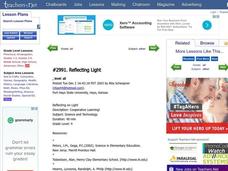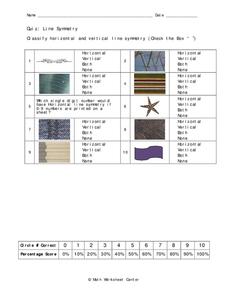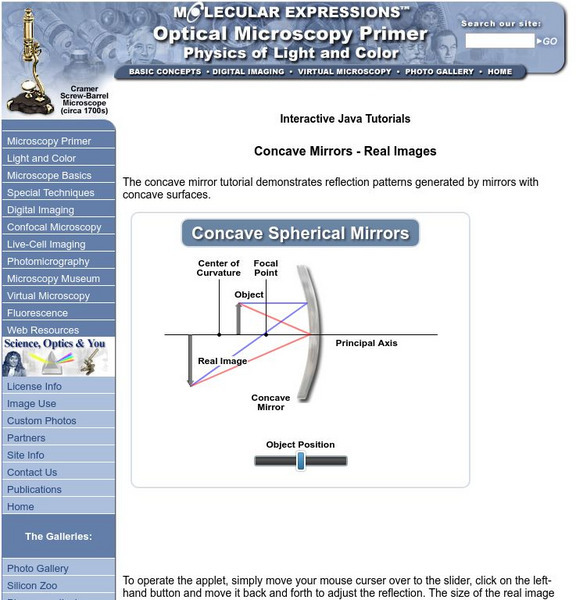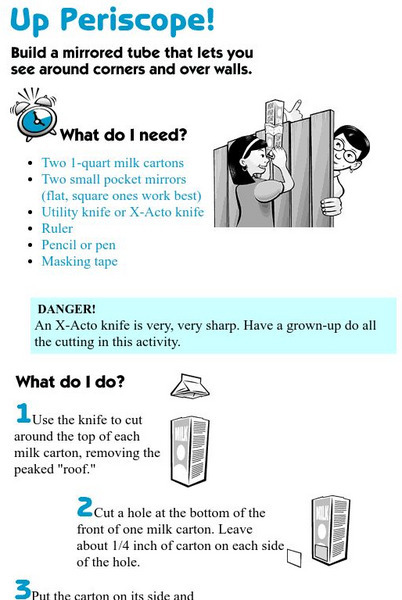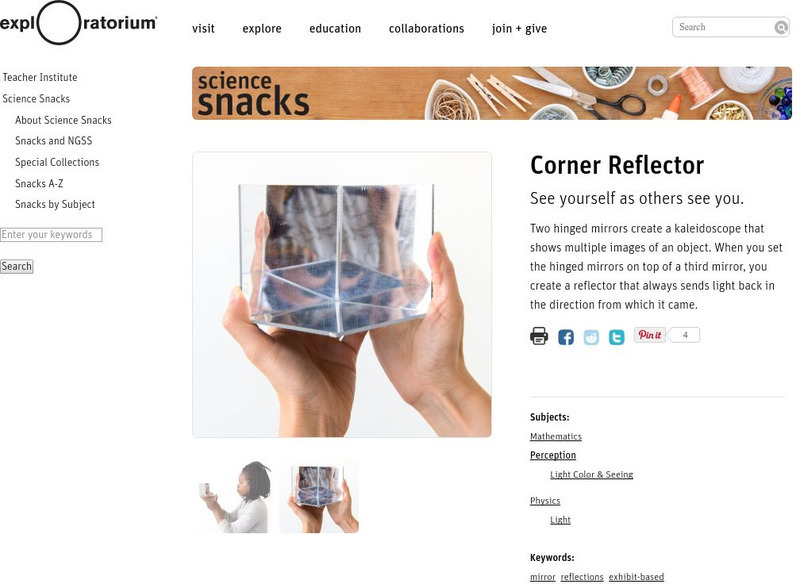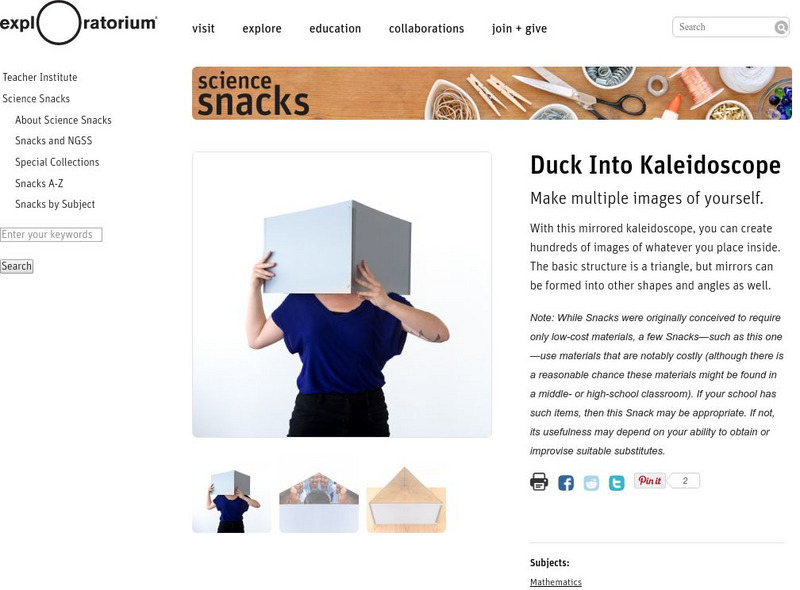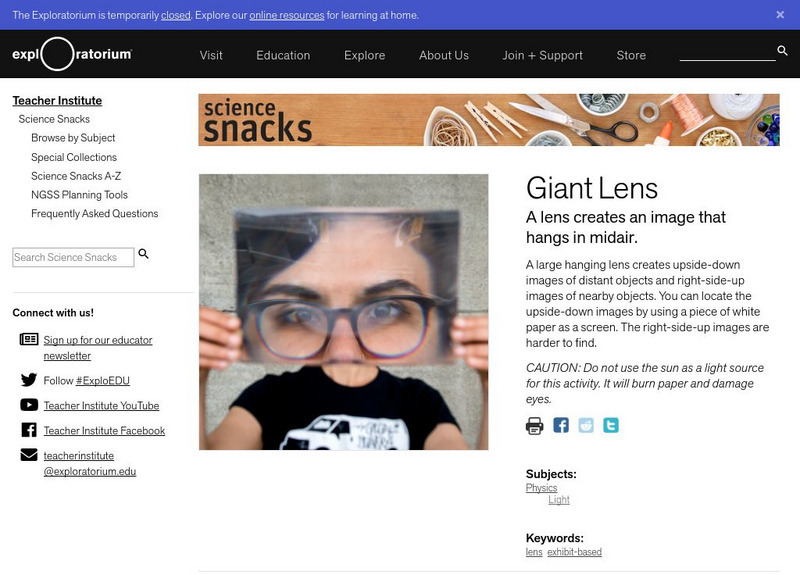Curated OER
How We See Things
Students explain that when a beam of light is reflected from its surface, it changes direction. In this virtual science experiment lesson plan, students complete an activity that requires them to investigate how flat mirrors reflect...
Curated OER
Year 6 Booster shape pg 1
In this reflection worksheet, students reflect the shapes in the mirror lines and draw them on the other side. They complete 2 drawings. The answers are on the last page.
Curated OER
Reflecting Light
Students are introduced to the reflective properties of light and use mirrors to make light from a source reflect onto a specific target. They take turns and record the amount of time it took to correctly reflect the light.
Curated OER
Plane Mirrors
Students investigate the law of reflection by using mirrors. In this physics lesson plan, students operate a robot using IR controllers. They explain the path of light as it reflects through a surface.
Curated OER
Magic Mirror Box
Students observe a plywood box with mirrors. In this mirror and light lesson, students make informal, individual investigations with a plywood box that has been fitted with mirror squares. They use observation skills and investigate...
Curated OER
Line Symmetry
In this line symmetry instructional activity, 10th graders solve 10 different problems related to various forms of line symmetry. They classify each line of symmetry illustrated as horizontal, vertical, both, or neither. Then students...
Curated OER
Mirrors and Lenses
Students identify the characteristics of mirrors and lenses. In groups, they describe the types of images formed by converging and diverging mirrors and calculate the magnification of a spherical mirror. They follow the same procedure...
Curated OER
Science
Third graders study light and shadow, participate in mirror activities, and build a periscope.
Curated OER
Through the Looking Glass
Students conduct Internet 'treasure hunts' to explore how everyday items, both in their antique and modern forms, possess historic and cultural significance.
Florida State University
Florida State University: Microscopy Primer: Concave Mirrors: Real Images
Florida State University offers an interactive Java applet demonstrating the object-image relationships for a concave mirror. The position of the object can be dragged along the principal axis and the location, orientation, and size of...
Smithsonian Institution
Smithsonian Learning Lab: Turn About's Fair Play! Mirrors and How They Reflect
Teachers can download this teaching package that looks at light and symmetry through the use of mirrors. Students will enjoy the nine mirror challenges, along with the hands-on activities described in the lessons. Teachers will...
University of New South Wales (Australia)
University of New South Wales: School of Physics: Physclips: Geometrical Optics
Physiclips thoroughly presents geometrical optics concepts like rays, refraction, Snell's law, total internal reflection, dispersion, mirrors, and lenses with animations and film clips.
Canada Science and Technology Museum
Canada Science and Technology Museum: Background Information for Light
Light! How do we see? What makes light? Find out everything you need to know through the Q&As on this site.
Exploratorium
Exploratorium: Up Periscope!
Children can look around corners with this homemade periscope. Great instructions at this Exploratorium site on how to build a periscope.
Georgia State University
Georgia State University: Hyper Physics: Mirrors in Imaging
A discussion from Georgia State University of different types of mirrors and the images which they create. Discusses different instruments which use mirrors to produce images.
Georgia State University
Georgia State University: Hyper Physics: Mirror Instruments
This site from Georgia State University discusses the means by which mirrors and lenses are combined to produce an optical instrument which accomplishes a specific purpose. Good illustrations.
My Science Site
Mirrors, Lenses and Your Eyes
This resource explores the science behind light and how mirrors reflect it. Also contains information on lenses both convex and concave.
Open Curriculum
Open Curriculum: Images, Quantitatively
This article helps students quantitatively describe the changes in images on mirrors or other surfaces.
Other
Atmos: Optical Design and Analysis Software
This is a page written by a member of the Amateur Telescope Makers Association, Massimo Riccardi. It describes a downloadable software program which can be used to analyze and design mirrors to exact specifications.
Other
Fraser Valley Astronomers Society: Mirror Making
Directions and suggestions for making a parabolic mirror out of epoxy for use in a reflecting telescope. Links provided for sources of epoxy.
Exploratorium
Exploratorium: Science Snacks: Corner Reflector
By creating a kaleidoscope using a set of hinged mirrors students can see themselves as others do! This activity uses mirrors to create multiple images of an object.
Exploratorium
Exploratorium: Science Snacks: Cylindrical Mirror
In this investigation, see yourself as others see you by using a cylindrical mirror instead of a flat mirror.
Exploratorium
Exploratorium: Science Snacks: Duck Into Kaleidoscope
Create hundreds of images of yourself in this activity by making a mirrored kaleidoscope.
Exploratorium
Exploratorium: Science Snacks: Giant Lens
In this activity, students create an image that hangs in midair by using a lens.




